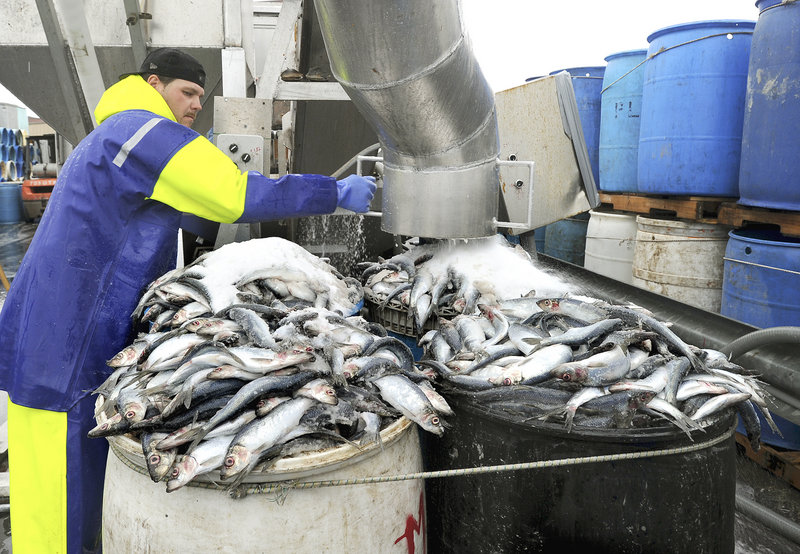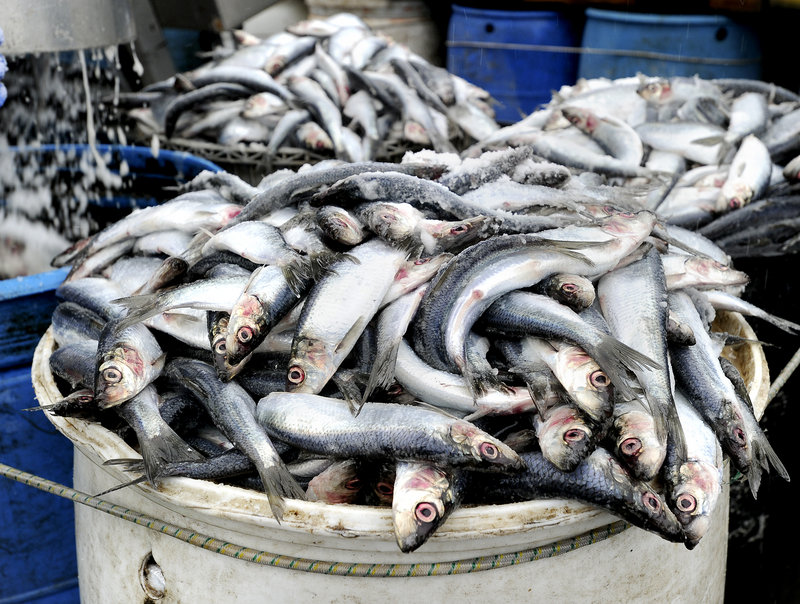A swarm of hungry seagulls wheeled above the Dropping Springs Bait Co. on the Portland Fish Pier last week as a truck filled with Gulf of Maine herring dumped its glistening contents into barrels for salting.
The herring, freshly landed in South Portland by the trawler Irish Venture, was destined for lobster traps up and down the coast. At this time of year, as the lobster season shifts into high gear, ensuring a good supply is vital, said Jeff Legere, operations manager at the bait company.
But with New England fishery regulators poised to vote on a new management plan for herring Thursday, lobstermen can’t take the supply of bait for granted.
“You want to preserve the fishery but not put people out of work,” said Legere.
The draft plan developed by the New England Fishery Management Council aims to cut down on the number of river herring, groundfish and other marine life unintentionally killed by the herring fishery, and provide better information on the health of herring stocks.
“Thursday is a big day for herring,” said Lori Steele, management plan coordinator for the council, which will meet in Danvers, Mass.
The wide-ranging plan proposes a number of alternative measures, such as banning trawlers from groundfish spawning grounds and requiring an official observer on board for all fishing trips. The plan has pitted the 35 to 40 midwater trawlers, based mostly in Maine and Massachusetts, against environmental groups, commercial groundfishermen and recreational anglers.
While herring is no longer in demand for human consumption in New England — the region’s once-thriving sardine canneries have gone out of business — its ecological importance is immense as a food source for groundfish, marine mammals, birds and other species. Herring is the preferred fish bait of Maine’s lobster industry, which generated $300 million in sales last year and thousands of jobs at bait shops, processing plants and restaurants.
“It is a little fish but a very important fish,” said Steele.
Unlike some groundfish species, Atlantic herring is not considered overfished and the population appears to be at a sustainable level, according to regulators.
But because the science used to assess the stocks is uncertain, the fishing quota for herring was drastically reduced in 2009 from 145,000 metric tons to 92,000 metric tons a year, where it remains.
The fishery has been the focus of several lawsuits. EarthJustice, an environmental law firm, sued the federal government in 2008 on behalf of Port Clyde’s Midcoast Fishermen’s Association — its president, Glen Libby, is a member of the New England Fishery Management Council — to ban herring trawlers from groundfish spawning grounds, which are already off-limits to groundfishing vessels. A decision on the lawsuit is pending, said EarthJustice lawyer Roger Fleming of Appleton.
Nearly four years in the making, work on the amendment has moved at the same slow pace as the lawsuit, said those involved in the process.
“It is a tough issue, very political and a lot of pressure from interests that are not directly related to the herring fishery,” said Steele.
Environmentalists are worried that the council, under pressure from the industry, will remove some of the proposed restrictions Thursday. Environmental advocates have deluged the council with thousands of letters and emails urging adoption of the draft plan as it now stands.
“The lobbyists will be at the meeting asking the council to take provisions out of the document before the public has a chance to comment on them,” said Peter Baker, director of the Herring Alliance, a coalition of environmental groups formed by Pew Charitable Trusts.
Herring fishermen say those concerns are unfounded. Mary Beth Tooley, a member of the council and government affairs consultant to the O’Hara Corp., which operates two herring trawlers out of Rockland, said she expects the draft proposal to go forward as is.
“I really don’t understand what the angst is about,” said Tooley.
Some of those in the herring industry say they will continue to raise concerns about the management plan, which they say is too heavy handed and could drive many fishermen out of business because of increased operating costs.
“The amount of herring we take is so small,” said Jeff Kaelin of Winterport, a government relations consultant to Lund’s Fisheries.
The Maine Lobstermen’s Association has stayed out of the controversy. Patrice McCarron, the group’s executive director, said lobstermen do not want to interfere in how the fishery is managed.
“We wouldn’t want the herring industry commenting on how many (lobster) traps we can have,” she said.
Once the council approves a draft document, the public will have a chance to comment on the provisions during a 45-day, yet-to-be-scheduled period. Then the plan will go back to the council. Regulators say a final management plan could emerge some time next winter.
Staff Writer Beth Quimby can be contacted at 791-6363 or at:
bquimby@pressherald.com
Send questions/comments to the editors.





Success. Please wait for the page to reload. If the page does not reload within 5 seconds, please refresh the page.
Enter your email and password to access comments.
Hi, to comment on stories you must . This profile is in addition to your subscription and website login.
Already have a commenting profile? .
Invalid username/password.
Please check your email to confirm and complete your registration.
Only subscribers are eligible to post comments. Please subscribe or login first for digital access. Here’s why.
Use the form below to reset your password. When you've submitted your account email, we will send an email with a reset code.